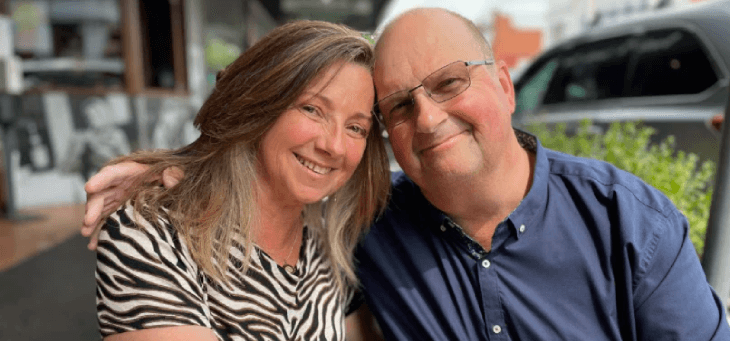At age 22, Leanne Bippus woke up in hospital two days after being rushed into surgery for a long-awaited kidney transplant.
“It was very emotional, because I knew someone had passed away, and I knew that there was a family there grieving,” she said.
When she awoke, there was another patient in the room.
A nurse introduced her to David Jellie, and told them something that would form a deep bond lasting nearly 20 years.
“We shared the donor. I have the right kidney, and he has the left kidney,” she said.
“It’s amazing because we understand each other. We know what the other one was going through.”
Australian organ donation register rates remain low
When Ms Bippus and Mr Jellie received their kidneys, organ donor rates in Australia were among the lowest in the western world.
Since then, little has changed despite years of public awareness campaigns, major reforms to the organ donation system, and strong public support for the idea.
Mr Jellie said given his experience, he was disappointed by the low rates of people who had signed up to the national register.
“All that people need to understand is that they’re helping someone who is sick,” Mr Jellie said.
“That person [the donor] may be gone but they’re living along with the organ.”
He said he wouldn’t be alive if it hadn’t been for the kidney he received 19 years ago.
While 80 per cent of Australians say they would consent to being a donor, only 30 per cent are registered.
Advocates say it’s now time to rethink one of the biggest reforms to the organ donor registration system by removing it from the state-based driver licensing systems back in 2009, and shifting to a national register.
“The idea of a national register was the right idea,” Australian Organ and Tissue Authority chief executive officer Lucinda Barry said.
“Whether removing it from drivers’ licences at the same time was the right idea … I guess we can question that.”
At the time, there was concern people weren’t making an informed decision when agreeing to become a donor when getting or renewing their licence.
But the data makes it clear the policy experiment failed.
In every state that removed the organ donation option from the driver licensing system, donor registration rates have remained stagnant.
The only state that didn’t make the change was South Australia, where organ donor registration rates have consistently gone up, and are now by far the highest in the country.
“In Victoria, only 22 per cent of the population is registered to be an organ donor. In South Australia, it’s 73 per cent,” said Chris Thomas, chief executive officer of advocacy group Transplant Australia.
“I think it was easier on the drivers licence because it was front and centre every five or 10 years whenever you renewed it.
“That eventually flows into the consent rates the families agreeing to donation and more people becoming available for organ donation and more people receiving a transplant.”
Ms Bippus said hearing about the low rates made her reflect on her own situation.
“It’s quite sad, because if someone didn’t make that decision, if a family didn’t know their loved one’s final wish, I wouldn’t be here,” she said.
Drivers licence change would be ‘exceptionally complex’
Royal Melbourne Hospital organ transplant surgeon, Amanda Robertson, thinks licences would help bring organ donations back into everyday conversations.
“It might just trigger that conversation that night when they go home and talk to their family, and sign up for it,” Ms Robertson said.
“Potentially, they can then save probably, you know, seven or eight lives by being organ donor.”
Australia Talks data shows 81 per cent of us would be willing to donate our organs after we die. But only one in three of us is registered. Donor families and transplant recipients say it’s time that changed.
DonateLife South Australia’s state medical director, Stewart Moodie, said licence registration had been key to the state’s success in boosting donor rates.
“South Australia has the highest rate of sign-up in the country because of the licence, leading to more families agreeing to donation when it is possible,” Mr Moodie said.
“Ticking the donor box when completing your drivers licence registration is a simple, convenient and effective way for community members to indicate their support for organ and tissue donation after death.”
Ms Barry from the Australian Organ and Tissue Authority said the South Australian example was compelling.
“There is no doubt looking at the data out of South Australia that having drivers licences is a way to increase registration in Australia,” she said.
“So we have actually recommended that all jurisdictions return to having drivers licences as an option to register in Australia.”
But she said the change would require cooperation across the country.
“We would need all states and territories to agree, and that’s across all levels. It’s not just the health ministers, but also the road ministers,” Ms Barry said.
“I think there is support out there. But it’s exceptionally complex to do.”
Most states and territories contacted by the ABC said they were open to reintroducing a licensing system, if it was coordinated on a federal level.
Meanwhile, both Ms Bippus and Mr Jellie say it’s time to get it done.
“It needs to be put back on the licences where they can tick it and where they can say, ‘yep, I’m going to do it’,” Mr Jellie said.
“We’ve had it, we’ve done it, it worked,” Ms Bippus said.
 © 2020 Australian Broadcasting Corporation. All rights reserved.
© 2020 Australian Broadcasting Corporation. All rights reserved.
ABC Content Disclaimer

